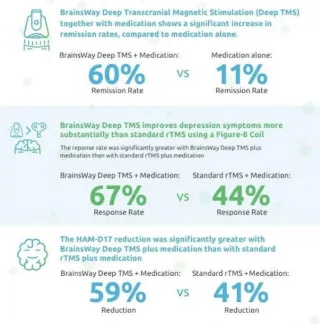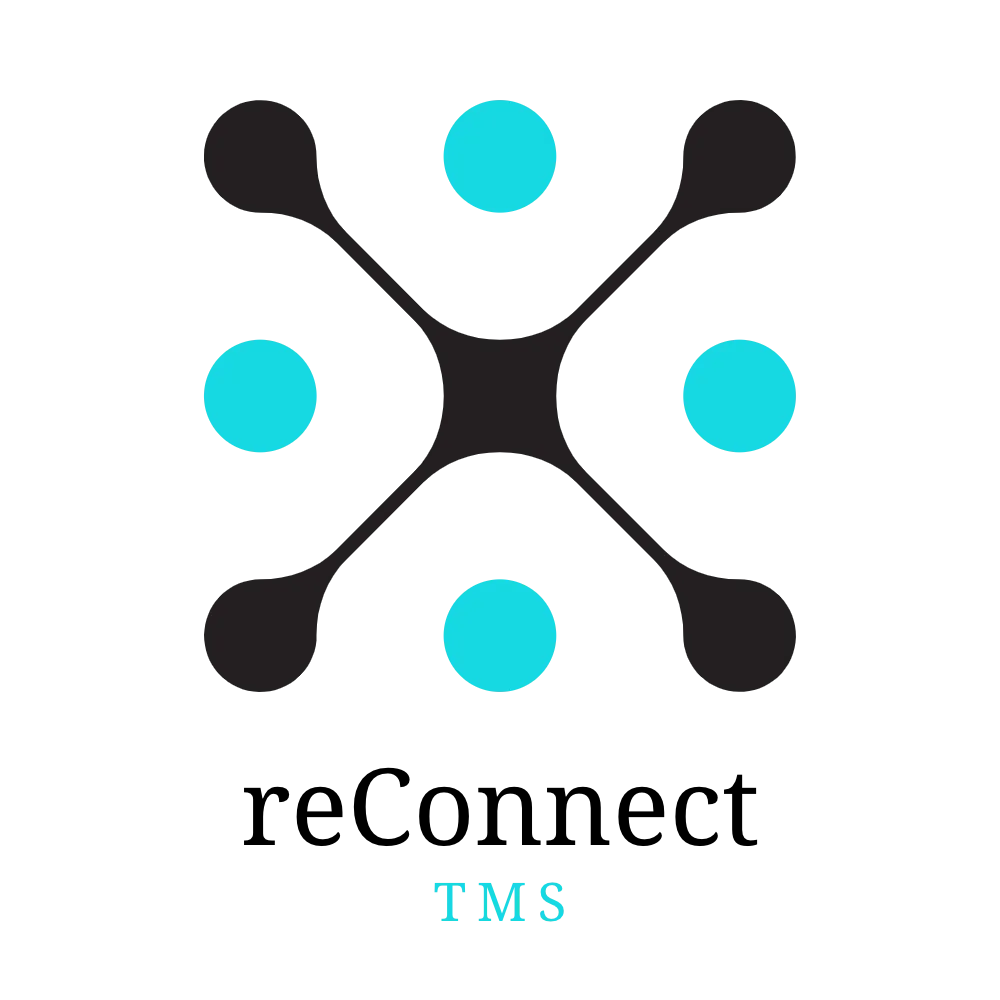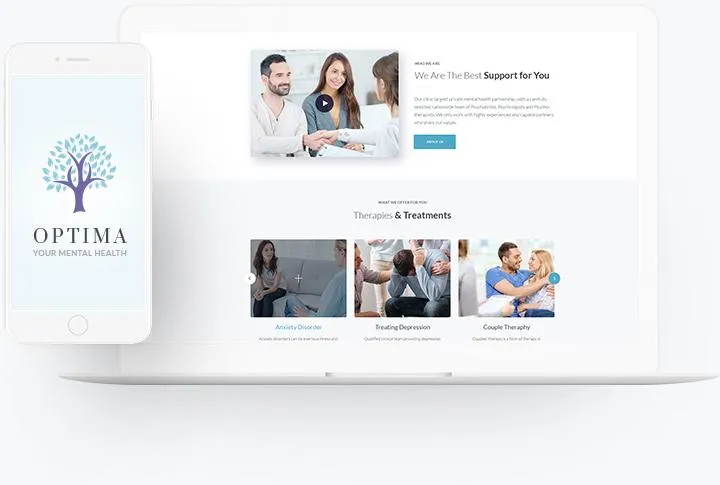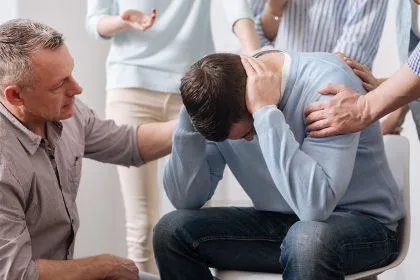Providing Australians with access to the world’s best mental health therapies
3 Albert Coates Ln, Melbourne VIC 3000, AU
TMS FAQs
Providing Australians with access to the world’s best mental health therapies
TMS FAQs
What is Transcranial Magnetic Stimulation?
Transcranial Magnetic Stimulation (TMS) is a painless and effective treatment for depression and has been used to treat thousands of patients worldwide. It has also been used to treat conditions such as Anxiety, Obsessive Compulsive Disorder (OCD), PTSD, Tinnitus amongst other conditions.
TMS is not the same as Electroconvulsive Therapy (ECT). TMS uses magnetic pulses on specific areas of the brain and does not require an anaesthetic. You can go about your normal activities, including driving, immediately after treatment.
What is the cost of TMS treatment?
Our team will conduct an individual assessment to ensure TMS treatment is provided to you at the most cost effective way possible. A number of additional factors include:
Being concessionally entitled - valid healthcare cardholder.
Eligible to be covered under your current health-fund provider.
Eligible to receive Medicare funding.
Please reach out to our team directly to discuss your eligible treatment payment options.
Paying for TMS privately
An acute course covers 35 sessions along with Psychiatrist assessments and reviews. Rebates are available through medicare.
Health Care Cardholders
Please speak with our Patient care team directly to discuss whether you may be eligible and what costs may be covered under your current provider.
Private Insurance/ Workcover/ DVA
If approved, patients do not receive a rebate from the insurer as it is our accounts team that send the invoices directly to the insurer. All treatments are covered by the insurer and there are no out of pocket expenses for the patient during the treatment.TMSCA do not require a copy of the health fund membership card.
TMS for eligible medicare applicants
As of 1 November 2021, new items for Repetitive Transcranial Magnetic Stimulation (rTMS) therapy services have been added to the Medicare Benefits Schedule (MBS) for eligible patients with diagnosed medication-resistant major depressive disorder. The four new items will make MBS subsidised rTMS therapy available for patients over the age of 18 years who have tried at least two classes of antidepressants and remain unwell. It will cover patients who have not received rTMS therapy previously. Medicare will cover 85% of the treatment costs.More information can be found through the rTMS Medicare MBS listingAdditional cost gap coverage is available for eligible health cardholders.
Is TMS treatment effective?
Deep TMS has an approximate 67% response rate and over a 50% remission rate. TMS has been shown to be effective in adult patients regardless of:
• Age
• Number of prior depression episodes
• Illness duration
• Number of antidepressants trialled (ranges from 0–14)
Patients who initially respond to TMS have a high chance of responding to treatment again if they relapse.

How do I get started?
Often times, doctors send referrals to us via fax or email - however, sometimes patients email the referral to us directly. Once we have the referral, the patient is contacted within 24 hours.
An Initial Assessment is booked with one of our psychiatrists to determine suitability and safety to treatment. If the patient is with a funding body, after the report is finalised from the Initial Assessment, the funding request and paperwork will be sent to their funding body.
If approved, the patient will be contacted to start arranging their appointments at the clinic.
If declined, the patient will be contacted, and they can choose whether they would still like to proceed as a private paying patient or whether they will no longer pursue TMS treatment.
If a patient is not registered with a funding body and proceeds as a private patient, they will be contacted to arrange appointments at the clinic, once the Initial Assessment has been completed and the Psychiatrist has confirmed suitability.
Does Medicare cover treatment?
As of 1 November 2021, new items for Repetitive Transcranial Magnetic Stimulation (rTMS) therapy services have been added to the Medicare Benefits Schedule (MBS) for eligible patients with diagnosed medication-resistant major depressive disorder. The four new items will make MBS subsidised rTMS therapy available for patients over the age of 18 years who have tried at least two classes of antidepressants and remain unwell. It will cover patients who have not received rTMS therapy previously. Medicare will cover 85% of the treatment costs. Further details can be found though the link below:
http://www.mbsonline.gov.au/internet/mbsonline/publishing.nsf/Content/Factsheet-rTMS-211025
What is the process for TMS treatment?
Patient Care Team contact
A Coordinator will contact you within 24 hours of receiving your referral. During the call, our Coordinator will ask you some screening questions, help to locate your most convenient clinic location, and book your initial assessment. They will also facilitate funding arrangements (if required) after completion of the initial assessment.
Initial assessment
A Psychiatrist and TMS Clinician will assess your suitability and treatment history and establish a baseline measure which will be used to determine whether the treatment is working.
Session 1 Resting motor threshold
The dose and individual TMS treatment will be determined.
Session 2-21 Acute treatment (Phase 1)
In this phase you will have 5 sessions per week. A TMS Clinician will measure how you are responding to treatment at sessions 1, 12 and 18. A Progress Report is delivered to your treating team at the end of this treatment phase.
Session 22- 31 Acute treatment (Phase 2)
After the first phase of treatment, changes in your mood will most likely be noticeable. If TMS is working for you, treatment will continue. Your response will be assessed again at session 28. A report will be delivered to your treating team at the end of this treatment phase. Treatment may be extended if necessary, depending upon your response.
Ongoing - Maintenance
After you have completed the acute phase of treatment, as part of your relapse prevention plan, you may be prescribed ongoing maintenance treatment which will taper down to 1 session per week or 1 session per fortnight.
How do I refer a friend or client to TMS?
You can encourage your friend or relative or client to get a referral from either their GP or their Psychiatrist. We have our referral form on our website. Once this is completed they can send it through to our patient care team via email to admin@reconnecttms.com.au
What is TBS (Theta burst)?
Theta Burst Stimulation (TBS) is a newer form of Transcranial Magnetic Stimulation (TMS) where pulses are applied in a certain pattern called bursts. Research studies with TBS have shown to produce similar if not greater effects on brain activity compared to standard repetitive transcranial magnetic stimulation (rTMS). The theta bursts pattern consists of three bursts given at 50Hz and repeated every 200 ms. TBS protocols have a major advantage in comparison to the standard rTMS protocol in that the treatment can be administered within a much short period of time.
Safety and Efficacy of TBS
Clinical studies on TBS indicate that TBS was not found to have higher rates of side effects or poorer safety profiles in comparison to standard rTMS. In both the conventional form of rTMS as well as TBS the common side effects includes headaches and fatigue. There is a very minimal risk of seizures in both forms of Transcranial magnetic stimulation (TMS). TBS when applied to the frontal cortices is associated with antidepressant effects which are of equal if not greater than the convention rTMS high frequency treatments.
I’ve just finished a course of acute treatment as an inpatient, can I go straight into maintenance treatment with you as an outpatient?
Yes, however patients would still need to be booked for an Initial Assessment if they are new to reConnect TMS. This is in order for one of our Psychiatrists to determine the protocol for treatment and frequency of treatment.
What is the patient criteria for TMS treatment?
TMS is recommended for patients with depression who:
• Have trialed at least two antidepressants, or
• Experience treatment-resistant depression
TMS can be used as an augmentation therapy or as a monotherapy.
• Most patients combine TMS treatment with antidepressant medications.• Some patients who do not want to take antidepressants, or who would like a break from antidepressants, undergo TMS as a monotherapy.
Contraindications and precautions.
• Patients with implants in their head (such as Cochlear implants, nerve stimulators or intracranial clips) may not be eligible for treatment. Note: dental fillings, braces and retainers do not pose a risk to TMS and are not factors for exclusion.
• Patients with a history of seizures within two years at the time of referral maynot be eligible. History of seizures does not automatically exclude patients from treatment but may require a review.
Does TMS treatment hurt?
No, TMS therapy usually does not hurt. You may experience some discomfort on your scalp during treatment and a tapping feeling on your forehead.
What is the difference between TMS and dTMS?
Both TMS and dTMS stimulate targeted areas of the brain, but as the name suggests, dTMS reaches areas that are found deeper in the brain.
Deep transcranial magnetic stimulation is a type of TMS that uses a specially designed coil to achieve deeper and broader penetration of electromagnetic stimulation into the brain. In people with obsessive compulsive disorder, stimulation of the medial prefrontal cortex has been found to improve symptoms.
What is the wait time?
An initial assessment can be completed within 1-2 weeks of receiving the referral. The clinic you wish to attend, will determine the waiting time. We endeavour to get the patient booked ASAP.
What should I be doing during treatment?
Some people choose to relax with their eyes closed, others fall asleep whilst others prefer to watch movies or listen to music on their phones. It is important to try to be in the same position during treatment, so the coil does not get out of position. However, should you fall asleep and move, our Clinicians will be monitoring you to ensure the coil is always in place.
Will a Doctor be administering the treatment to me?
Our Psychiatrists typically attend the initial mapping sessions but do not administer TMS treatment. The treatment is administered by our comprehensively trained TMS Clinicians.
What is Transcranial Magnetic Stimulation?
Transcranial Magnetic Stimulation (TMS) is a painless and effective treatment for depression and has been used to treat thousands of patients worldwide. It has also been used to treat conditions such as Anxiety, Obsessive Compulsive Disorder (OCD), PTSD, Tinnitus amongst other conditions.
TMS is not the same as Electroconvulsive Therapy (ECT). TMS uses magnetic pulses on specific areas of the brain and does not require an anaesthetic. You can go about your normal activities, including driving, immediately after treatment.
What is the cost of TMS treatment?
Our team will conduct an individual assessment to ensure TMS treatment is provided to you at the most cost effective way possible. A number of additional factors include:
Being concessionally entitled - valid healthcare cardholder.
Eligible to be covered under your current health-fund provider.
Eligible to receive Medicare funding.
Please reach out to our team directly to discuss your eligible treatment payment options.
Paying for TMS privately
An acute course covers 35 sessions along with Psychiatrist assessments and reviews. Rebates are available through medicare.
Health Care Cardholders
Please speak with our Patient care team directly to discuss whether you may be eligible and what costs may be covered under your current provider.
Private Insurance/ Workcover/ DVA
If approved, patients do not receive a rebate from the insurer as it is our accounts team that send the invoices directly to the insurer. All treatments are covered by the insurer and there are no out of pocket expenses for the patient during the treatment.TMSCA do not require a copy of the health fund membership card.
TMS for eligible medicare applicants
As of 1 November 2021, new items for Repetitive Transcranial Magnetic Stimulation (rTMS) therapy services have been added to the Medicare Benefits Schedule (MBS) for eligible patients with diagnosed medication-resistant major depressive disorder. The four new items will make MBS subsidised rTMS therapy available for patients over the age of 18 years who have tried at least two classes of antidepressants and remain unwell. It will cover patients who have not received rTMS therapy previously. Medicare will cover 85% of the treatment costs.More information can be found through the rTMS Medicare MBS listingAdditional cost gap coverage is available for eligible health cardholders.
Is TMS treatment effective?
Deep TMS has an approximate 67% response rate and over a 50% remission rate. TMS has been shown to be effective in adult patients regardless of:
• Age
• Number of prior depression episodes
• Illness duration
• Number of antidepressants trialled (ranges from 0–14)
Patients who initially respond to TMS have a high chance of responding to treatment again if they relapse.

How do I get started?
Often times, doctors send referrals to us via fax or email - however, sometimes patients email the referral to us directly. Once we have the referral, the patient is contacted within 24 hours.
An Initial Assessment is booked with one of our psychiatrists to determine suitability and safety to treatment. If the patient is with a funding body, after the report is finalised from the Initial Assessment, the funding request and paperwork will be sent to their funding body.
If approved, the patient will be contacted to start arranging their appointments at the clinic.
If declined, the patient will be contacted, and they can choose whether they would still like to proceed as a private paying patient or whether they will no longer pursue TMS treatment.
If a patient is not registered with a funding body and proceeds as a private patient, they will be contacted to arrange appointments at the clinic, once the Initial Assessment has been completed and the Psychiatrist has confirmed suitability.
Does Medicare cover treatment?
As of 1 November 2021, new items for Repetitive Transcranial Magnetic Stimulation (rTMS) therapy services have been added to the Medicare Benefits Schedule (MBS) for eligible patients with diagnosed medication-resistant major depressive disorder. The four new items will make MBS subsidised rTMS therapy available for patients over the age of 18 years who have tried at least two classes of antidepressants and remain unwell. It will cover patients who have not received rTMS therapy previously. Medicare will cover 85% of the treatment costs. Further details can be found though the link below:
http://www.mbsonline.gov.au/internet/mbsonline/publishing.nsf/Content/Factsheet-rTMS-211025
What is the process for TMS treatment?
Patient Care Team contact
A Coordinator will contact you within 24 hours of receiving your referral. During the call, our Coordinator will ask you some screening questions, help to locate your most convenient clinic location, and book your initial assessment. They will also facilitate funding arrangements (if required) after completion of the initial assessment.
Initial assessment
A Psychiatrist and TMS Clinician will assess your suitability and treatment history and establish a baseline measure which will be used to determine whether the treatment is working.
Session 1 Resting motor threshold
The dose and individual TMS treatment will be determined.
Session 2-21 Acute treatment (Phase 1)
In this phase you will have 5 sessions per week. A TMS Clinician will measure how you are responding to treatment at sessions 1, 12 and 18. A Progress Report is delivered to your treating team at the end of this treatment phase.
Session 22- 31 Acute treatment (Phase 2)
After the first phase of treatment, changes in your mood will most likely be noticeable. If TMS is working for you, treatment will continue. Your response will be assessed again at session 28. A report will be delivered to your treating team at the end of this treatment phase. Treatment may be extended if necessary, depending upon your response.
Ongoing - Maintenance
After you have completed the acute phase of treatment, as part of your relapse prevention plan, you may be prescribed ongoing maintenance treatment which will taper down to 1 session per week or 1 session per fortnight.
How do I refer a friend or client to TMS?
You can encourage your friend or relative or client to get a referral from either their GP or their Psychiatrist. We have our referral form on our website. Once this is completed they can send it through to our patient care team via email to admin@reconnecttms.com.au
What is TBS (Theta burst)?
Theta Burst Stimulation (TBS) is a newer form of Transcranial Magnetic Stimulation (TMS) where pulses are applied in a certain pattern called bursts. Research studies with TBS have shown to produce similar if not greater effects on brain activity compared to standard repetitive transcranial magnetic stimulation (rTMS). The theta bursts pattern consists of three bursts given at 50Hz and repeated every 200 ms. TBS protocols have a major advantage in comparison to the standard rTMS protocol in that the treatment can be administered within a much short period of time.
Safety and Efficacy of TBS
Clinical studies on TBS indicate that TBS was not found to have higher rates of side effects or poorer safety profiles in comparison to standard rTMS. In both the conventional form of rTMS as well as TBS the common side effects includes headaches and fatigue. There is a very minimal risk of seizures in both forms of Transcranial magnetic stimulation (TMS). TBS when applied to the frontal cortices is associated with antidepressant effects which are of equal if not greater than the convention rTMS high frequency treatments.
I’ve just finished a course of acute treatment as an inpatient, can I go straight into maintenance treatment with you as an outpatient?
Yes, however patients would still need to be booked for an Initial Assessment if they are new to reConnect TMS. This is in order for one of our Psychiatrists to determine the protocol for treatment and frequency of treatment.
What is the patient criteria for TMS treatment?
TMS is recommended for patients with depression who:
• Have trialed at least two antidepressants, or
• Experience treatment-resistant depression
TMS can be used as an augmentation therapy or as a monotherapy.
• Most patients combine TMS treatment with antidepressant medications.• Some patients who do not want to take antidepressants, or who would like a break from antidepressants, undergo TMS as a monotherapy.
Contraindications and precautions.
• Patients with implants in their head (such as Cochlear implants, nerve stimulators or intracranial clips) may not be eligible for treatment. Note: dental fillings, braces and retainers do not pose a risk to TMS and are not factors for exclusion.
• Patients with a history of seizures within two years at the time of referral maynot be eligible. History of seizures does not automatically exclude patients from treatment but may require a review.
Does TMS treatment hurt?
No, TMS therapy usually does not hurt. You may experience some discomfort on your scalp during treatment and a tapping feeling on your forehead.
What is the difference between TMS and dTMS?
Both TMS and dTMS stimulate targeted areas of the brain, but as the name suggests, dTMS reaches areas that are found deeper in the brain.
Deep transcranial magnetic stimulation is a type of TMS that uses a specially designed coil to achieve deeper and broader penetration of electromagnetic stimulation into the brain. In people with obsessive compulsive disorder, stimulation of the medial prefrontal cortex has been found to improve symptoms.
What is the wait time?
An initial assessment can be completed within 1-2 weeks of receiving the referral. The clinic you wish to attend, will determine the waiting time. We endeavour to get the patient booked ASAP.
What should I be doing during treatment?
Some people choose to relax with their eyes closed, others fall asleep whilst others prefer to watch movies or listen to music on their phones. It is important to try to be in the same position during treatment, so the coil does not get out of position. However, should you fall asleep and move, our Clinicians will be monitoring you to ensure the coil is always in place.
Will a Doctor be administering the treatment to me?
Our Psychiatrists typically attend the initial mapping sessions but do not administer TMS treatment. The treatment is administered by our comprehensively trained TMS Clinicians.
TMS therapy is now covered by Medicare
If your depression hasn’t responded well to two or more anti-depressants, you will eligible for Medicare reimbursement.


Providing Australians with access to the world’s best mental health therapies.
HEADQUARTERS
3 Albert Coates Ln, Melbourne VIC 3000, Australia
© 2023 reConnect TMS. All Rights Reserved.
Lorem ipsum dolor sit amet, consectetuer adipiscing elit. Aenean commodo ligula eget dolor. Aenean massa. Cum sociis natoque penatibus et magnis dis parturient montes, nascetur ridiculus mus. Donec quam felis, ultricies nec, pellentesque eu, pretium quis, sem. Nulla consequat massa quis enim. Donec pede justo, fringilla vel, aliquet nec, vulputate eget, arcu. In enim justo, rhoncus ut, imperdiet a, venenatis vitae, justo. Nullam dictum felis eu pede mollis pretium. Integer tincidunt. Cras dapibus. Vivamus elementum semper nisi. Aenean vulputate eleifend tellus. Aenean leo ligula, porttitor eu, consequat vitae, eleifend ac, enim. Aliquam lorem ante, dapibus in, viverra quis, feugiat a, tellus.
Phasellus viverra nulla ut metus varius laoreet. Quisque rutrum. Aenean imperdiet. Etiam ultricies nisi vel augue. Curabitur ullamcorper ultricies nisi. Nam eget dui. Etiam rhoncus. Maecenas tempus, tellus eget condimentum rhoncus, sem quam semper libero, sit amet adipiscing sem neque sed ipsum. Nam quam nunc, blandit vel, luctus pulvinar, hendrerit id, lorem. Maecenas nec odio et ante tincidunt tempus. Donec vitae sapien ut libero venenatis faucibus. Nullam quis ante. Etiam sit amet orci eget eros faucibus tincidunt. Duis leo. Sed fringilla mauris sit amet nibh. Donec sodales sagittis magna. Sed consequat, leo eget bibendum sodales, augue velit cursus nunc, quis gravida magna mi a libero. Fusce vulputate eleifend sapien.
Vestibulum purus quam, scelerisque ut, mollis sed, nonummy id, metus. Nullam accumsan lorem in dui. Cras ultricies mi eu turpis hendrerit fringilla. Vestibulum ante ipsum primis in faucibus orci luctus et ultrices posuere cubilia Curae; In ac dui quis mi consectetuer lacinia. Nam pretium turpis et arcu. Duis arcu tortor, suscipit eget, imperdiet nec, imperdiet iaculis, ipsum. Sed aliquam ultrices mauris. Integer ante arcu, accumsan a, consectetuer eget, posuere ut, mauris. Praesent adipiscing. Phasellus ullamcorper ipsum rutrum nunc. Nunc nonummy metus. Vestibulum volutpat pretium libero. Cras id dui. Aenean ut eros et nisl sagittis vestibulum. Nullam nulla eros, ultricies sit amet, nonummy id, imperdiet feugiat, pede. Sed lectus. Donec mollis hendrerit risus. Phasellus nec sem in justo pellentesque facilisis.
For Adults
You can call our highly experienced clinical team if your child, teenager or family is going through difficulties.
ANXIETY
DEPRESSION
BIPOLAR DISORDER
ADHD
A – Z OF ISSUES
For Children
You can call our highly experienced clinical team if your child, teenager or family is going through difficulties.
ADHD
ASPERGERS AND AUTISM
DEPRESSION
ANXIETY DISORDERS
A-Z OF ISSUES
For Business
You can call our highly experienced clinical team if your child, teenager or family is going through difficulties.
MEDICO LEGAL REPORTS
OCCUPATIONAL HEALTH
LOCUMS AND STAFFING
NEUROPSYCHOLOGICAL ASSESSMENTS
MENTAL CAPACITY ASSESSMETNS

WHO WE ARE
We Are The Best Support for You
Our clinic largest private mental health partnership, with a carefully selected nationwide team of Psychiatrists, Psychologists and Psychotherapists. We only work with highly experienced and capable partners who share our values.
WHAT WE OFFER FOR YOU
Therapies & Treatments
ONLINE SESSION
Get a Counselling Right Now
Our clinic largest private mental health partnership, with a carefully selected nationwide team of Psychiatrists, Psychologists and Psychotherapists. We only work with highly experienced and capable partners who share our values.

TMS therapy is now covered by Medicare
If your depression hasn’t responded well to two or more anti-depressants, you will eligible for Medicare reimbursement.

HEADQUARTERS
3 Albert Coates Ln, Melbourne VIC 3000, Australia
© 2023 reConnect TMS. All Rights Reserved.






